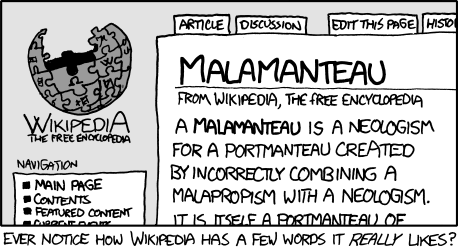Archive for Words words words
November 6, 2010 @ 9:10 am· Filed by Mark Liberman under Words words words
 Over at the Economist's Johnson blog, R.L.G. has launched a quixotic bid to rescue malamanteau, which Randall Munroe coined as part of a joke about what R.L.G. calls Wikipedia's "over serious tone when discussing goofy topics." (The rest of Munroe's joke struck a little closer to home: the strip's mouseover title was "The article has twenty-three citations, one of which is an obscure manuscript from the 1490's and the other twenty-two are arguments on LanguageLog.")
Over at the Economist's Johnson blog, R.L.G. has launched a quixotic bid to rescue malamanteau, which Randall Munroe coined as part of a joke about what R.L.G. calls Wikipedia's "over serious tone when discussing goofy topics." (The rest of Munroe's joke struck a little closer to home: the strip's mouseover title was "The article has twenty-three citations, one of which is an obscure manuscript from the 1490's and the other twenty-two are arguments on LanguageLog.")
After a suitably lengthy and serious debate, malamanteau lost the fight for an actual Wikipedia listing. But on November 4, R.L.G. found an ingenious argument for resuming the battle.
Read the rest of this entry »
Permalink
November 2, 2010 @ 8:51 am· Filed by Mark Liberman under Words words words
A "short imagined monologue" by Ben Greenman at McSweeney's Internet Tendency, "I am the invisible thing that holds together the two halves of a compound word":
When I first came to town, they were all around me, the words. They waved at one another in the street and chatted at parties. I was careful then because I was a newcomer and it is not my personality to stride right into the center of things and announce myself, especially since I am invisible. But I noticed it at once: some words looked good together.
In a few rare cases, like with "sword" and "play" and "rain" and "storm," they found their way to each other, but most words didn't really know what was good for them. "Trouble" liked "coat," and "sweet" liked "bone," and "air" spent years pining for "pickle." Can you imagine?
Read the rest of this entry »
Permalink
October 28, 2010 @ 12:29 pm· Filed by Geoffrey K. Pullum under Lost in translation, Words words words
Language Log has not so far commented on Jason Wire's 20 Awesomely Untranslatable Words from Around the World on the Matador Network. You might expect (since I yield to no Language Log writer in the fierceness of my hatred for things-people-have-no-words-for genre of writing about language) that I would hate it like poison. But in fact I rather liked it. I just want to point out, however, that not a single one of the words shows any of the promised untranslatability.
Read the rest of this entry »
Permalink
October 26, 2010 @ 10:37 am· Filed by Mark Liberman under Words words words
In the New Yorker article discussed in an earlier post about leaf-blower noise, Tad Friend wrote that "a Berkeley psychiatrist […] addressed the problem's demographic valence", describing an attempt to rebut the idea that anti-blower activists are "just some fat-ass fussy busses, rich white people in the suburbs, worrying about a little noise". Mark P noted in the comments that
I have never seen the term "demographic valence." I'm familiar with the term "valence" in chemistry and home decor. I can see how it could mean something like "attractiveness." But in this context, I have to assume that it means the tendency of noise to be a problem within different demographic groups.
Read the rest of this entry »
Permalink
October 21, 2010 @ 3:53 am· Filed by Geoffrey K. Pullum under Ignorance of linguistics, Words words words
Darryl Shpak writes to me: I came across the following surprising claim this morning; you might find it interesting:
"50 per cent of all words are negative, and only 30 per cent are positive, in both English and Spanish. So we tend to have a much more colorful, rich, negative vocabulary, and it's all because our brains are built to be particularly excited by negative things."
Read the rest of this entry »
Permalink
October 16, 2010 @ 8:34 pm· Filed by Victor Mair under Words words words, Writing
Several people called my attention to an article entitled "The Most 'Chinese' Chinese Character," by Josh Chin, in the October 15, 2010 China Real Time Report of the Wall Street Journal.
Read the rest of this entry »
Permalink
October 15, 2010 @ 2:34 am· Filed by Ben Zimmer under Humor, Language and politics, Language and the media, Words words words
 My latest On Language column for The New York Times Magazine celebrates the fifth anniversary of Stephen Colbert's (re)invention of "truthiness" — a word we began tracking here on Language Log soon after it appeared on the premiere episode of "The Colbert Report." (See this post and links therein.) I got a chance to interview Colbert himself, and my latest Word Routes column for the Visual Thesaurus features an extended excerpt of the interview. Here's an excerpt of the excerpt:
My latest On Language column for The New York Times Magazine celebrates the fifth anniversary of Stephen Colbert's (re)invention of "truthiness" — a word we began tracking here on Language Log soon after it appeared on the premiere episode of "The Colbert Report." (See this post and links therein.) I got a chance to interview Colbert himself, and my latest Word Routes column for the Visual Thesaurus features an extended excerpt of the interview. Here's an excerpt of the excerpt:
BZ: I was a big supporter of "truthiness" from the early days, back when it was selected as Word of the Year by the American Dialect Society. I was there lobbying for it.
SC: Really? You were there, literally?
BZ: I was on the scene, yes.
SC: You're a member of the American Dialect Society?
BZ: I'm on the Executive Council of the American Dialect Society.
SC: Holy cow. Well then, thank you for pushing for it, because I married an English major. Getting a Word of the Year is the closest I'll ever come to having six-pack abs. That's maybe the sexiest thing I could do, to have a word recognized.
BZ: Now that it's in the New Oxford American Dictionary, that's got to be even better. You're even mentioned in the entry.
SC: Yeah. That's a real turn-on.
Read the rest here.
Read the rest of this entry »
Permalink
October 9, 2010 @ 6:56 am· Filed by Mark Liberman under Words words words
William Germano, "What are books good for?", The Chronicle Review, 9/26/2010:
Maybe we need to redefine, or undefine, our terms. I'm struck by the fact that the designation "scholarly book," to name one relevant category, is in itself a back formation, like "acoustic guitar." Books began as works of great seriousness, mapping out the religious and legal dimensions of culture. In a sense, books were always scholarly. Who could produce them but serious people? Who had the linguistic training to decode them? [emphasis added]
Read the rest of this entry »
Permalink
October 7, 2010 @ 12:56 pm· Filed by Geoffrey K. Pullum under Syntax, Words words words
Take a look at the use of the underlined verb in this recent story about an incident of boorish locker-room behavior toward a female reporter:
In the locker room, she was subjected to whistles and catcalls, eventually tweeting that she was avoiding eye contact with players.
Tweet is an invented verb, so it provides an interesting little experiment in syntactic change. It takes content clauses with the subordinator that, as the above example shows. Can it take a direct object plus content clause, like tell in She told him that she was leaving? Apparently so: if you Google for tweeted him that she, you get about 3,400 Google hits.
Read the rest of this entry »
Permalink
October 6, 2010 @ 4:59 pm· Filed by Geoffrey K. Pullum under Awesomeness, Language and culture, Words words words
Hey, guess what! The cricket story about not having a word for "impossible" wasn't the last "no-word-for-X" story! Matthew Izzi, who writes from Boston, is a new reader of Language Log, and clearly a quick study, because he has already learned to be skeptical of things-people-have-no-words-for stories. His antennae went up when he read the following photo caption (slide 4 of 5) on The New Yorker's "Book Bench" blog this morning:
Pukapuka, also known as Danger Island, was, in the nineteen-twenties, a sanctuary for nudism, a place where "sex is a game, and jealousy has no place." There is no word for "virgin" in the language.
Read the rest of this entry »
Permalink
October 6, 2010 @ 4:01 pm· Filed by Geoffrey K. Pullum under Language and culture, Words words words
The latest, laziest, and most stupid things-there-are-no-words-for snowclone use I have seen in quite a while (contributed by a Language Log reader who supplies no name other than "Flintoff's Gusset"):
Herein lies a cricket tale of a heady concoction of exceptional talent laced with self-belief to match. Such gargantuan self-belief, in fact, that just as the Piraha tribe of northwest Brazil speak an obscure language in which there is no concept of numbers, so in the lexicon of Ian Botham's cricket existence, there is no word for "impossible". He does not, and never has done, "can't".
Thus Mike Selvey, writing about Ian Botham on the ESPN cricinfo site.
Read the rest of this entry »
Permalink
October 4, 2010 @ 8:58 pm· Filed by Mark Liberman under Morphology, Words words words
Reader A.T. writes:
When I can't sleep, I go onto TED.com. I'm watching a talk by Pinker and he says syllabuses at one point (about 15:36). Not sure if you've blogged about syllabuses versus syllabi in the Language Log, but I think it'd be a pretty cool topic to discuss.
Read the rest of this entry »
Permalink
October 2, 2010 @ 8:04 am· Filed by Geoffrey K. Pullum under Words words words
I was a little surprised to encounter the neolexeme embiggen in a perfectly serious Economist report about Ascension Island:
If a future turn of events in Africa was seen as requiring the island's military role to be embiggened and its facilities rendered much more secure, it might be convenient if the islanders had no legal right to remain where they were.
Read the rest of this entry »
Permalink
 Over at the Economist's Johnson blog, R.L.G. has launched a quixotic bid to rescue malamanteau, which Randall Munroe coined as part of a joke about what R.L.G. calls Wikipedia's "over serious tone when discussing goofy topics." (The rest of Munroe's joke struck a little closer to home: the strip's mouseover title was "The article has twenty-three citations, one of which is an obscure manuscript from the 1490's and the other twenty-two are arguments on LanguageLog.")
Over at the Economist's Johnson blog, R.L.G. has launched a quixotic bid to rescue malamanteau, which Randall Munroe coined as part of a joke about what R.L.G. calls Wikipedia's "over serious tone when discussing goofy topics." (The rest of Munroe's joke struck a little closer to home: the strip's mouseover title was "The article has twenty-three citations, one of which is an obscure manuscript from the 1490's and the other twenty-two are arguments on LanguageLog.") My latest
My latest